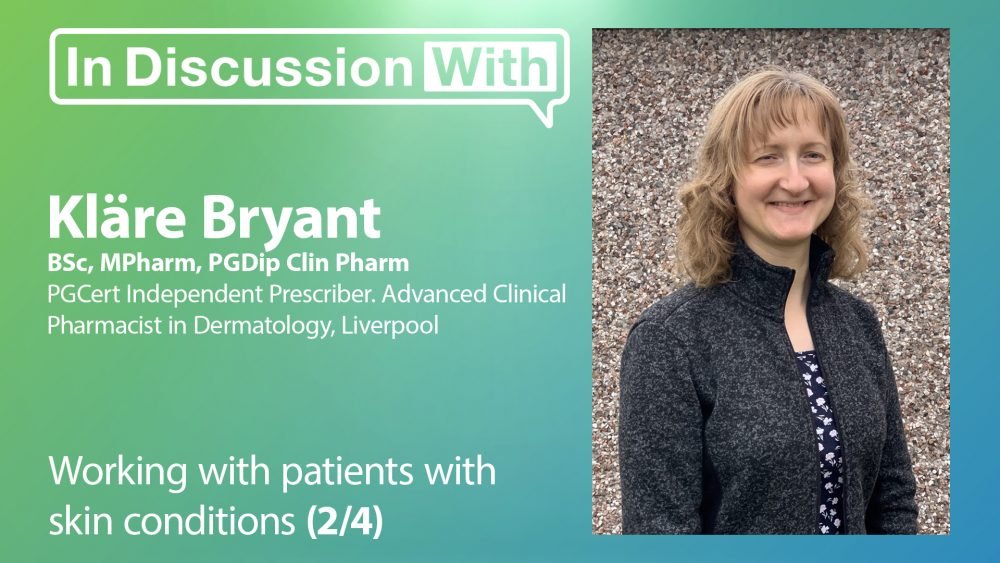Advertisment
Working with patients with skin conditions

Feedback from a satisfied patient illustrates the impact that good pharmaceutical care can have on dermatological disease, according to Kläre Bryant, advanced clinical pharmacist in dermatology at Liverpool University Hospitals.
She says: “Some feedback from one of my patients that just sticks in my mind – he said, “My skin is absolutely fantastic, it’s been the best it’s been for years! I can go out now and wear a pair of shorts and without feeling self-conscious. It’s absolutely great! I can go out and play with my grandchildren, I can go out in the sun, I can go in the swimming pool and it’s just fantastic! I’m in the best place with my skin that I’ve been for a long time”.”
This patient was taking oral methotrexate together with a number of topical treatments. As with her other patients, Ms Bryant worked with him, over several appointments, to optimise the topical treatments.
A range of topical treatments is used in the management of psoriasis. “Emollients are very important and then we’ve also got the maintenance sort of treatments such as Enstilar, Dovobet and Silkis ointment, which is the vitamin D [analogue] part of the Enstilar and Dovobet”, she explains. Enstilar and Dovobet are used to manage flares of the disease and can also be used when they are needed, and this can be worked out with the patient, she adds.
“Moisturising is very, very important”, says Ms Bryant, but it can be difficult to find the time to apply emollients. “I may advise patients – if they’re struggling – to put the moisturiser on when getting washed”, she says. After showering or bathing, “when you get out, get yourself dried and [while] the skin’s still a little bit damp, put your moisturiser on, wait a couple of minutes …..”,she suggests. This approach has the least impact on the day-to-day routine and ensures that the moisturiser is applied. Moisturisers are supplied from the pharmacy but can also be purchased over the counter. Increasingly, once-daily moisturisers are becoming available. These are ideal because, if applied after a daily bath or shower, that part of the treatment is done. The treatment creams such as Enstilar and Dovobet are designed for once-daily use anyway and can also be incorporated into treatment regimen, she says
Psoriasis treatment can be thought of like “tools in a toolbox” says Ms Bryant. “You’ve got all your tools in the toolbox. You’ve got your tablets – they take the most strain of treating the skin condition – and then you’ve got all your other tools in the toolbox where we’ve got to say we’ll use a bit of some of that or use some of that [and if] that doesn’t quite work then we just maybe switch it around a little bit”, she explains. The key to success is knowing what to use and when. For example, a large tub of greasy ointment to be applied four times a day is unlikely to be used by someone who has a busy schedule of meetings. “We need to work with the patient, with their lifestyle and come up with something that they’re actually going to do and that’s suitable for them”, emphasises Ms Bryant.
Educating patients about how to use their medications to manage their skin disease is also an important part of Ms Bryant’s work. People need to know that “they are allowed to put those medications, with that steroid in, on their skin every day for two or four weeks to get a flare under control. It’s upskilling and educating the patient to know that they can manage their own skin condition by doing that in between appointments – they don’t need to wait to get an appointment with somebody. They are ‘expert patients’; they know they can use those creams [and] topical medications to treat any flares – get on top of it before it gets bad – and then step back down from that and continue with their moisturising. It’s a very much a two-way thing – patients being educated to know what to do and having the tools to do it with”, she explains.
Kläre Bryant is an advanced clinical pharmacist in dermatology at Liverpool University Hospitals NHS foundation trust. She has an outpatient clinic at Broadgreen Hospital for patients receiving biologic therapies and another clinic at Aintree hospital for patients receiving systemic disease modifying anti-rheumatic drugs (DMARDs)
Read and watch the full series on our website or on YouTube.
This episode of ‘In Discussion With’ is also on Spotify. Listen to the full podcast now.





